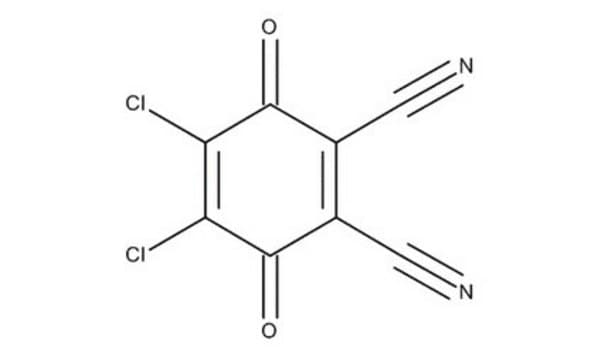8.07492
Pyrrole
for synthesis
Sinónimos:
Pyrrole
About This Item
Productos recomendados
vapor pressure
8.7 hPa ( 20 °C)
Quality Level
assay
≥97.0% (GC)
form
liquid
autoignition temp.
550 °C
potency
137 mg/kg LD50, oral (Rat)
expl. lim.
3.10-14.8 % (v/v)
pH
>6 (20 °C, 10 g/L in H2O)
bp
130-131 °C/1013 hPa
mp
-24 °C
transition temp
flash point 39 °C
density
0.97 g/cm3 at 20 °C
storage temp.
2-8°C
InChI
1S/C4H5N/c1-2-4-5-3-1/h1-5H
InChI key
KAESVJOAVNADME-UHFFFAOYSA-N
Application
- Therapeutic potential of pyrrole and pyrrolidine analogs: This review highlights the significant therapeutic potential of pyrrole derivatives, particularly in pharmacological contexts, underscoring their importance in drug development (Basha et al., 2022).
- Living on pyrrolic foundations–Advances in natural and artificial bioactive pyrrole derivatives: Discusses the role of pyrrole as a crucial building block in bioactive compounds, emphasizing its versatility and broad application range in medicine and synthetic chemistry (Domagala et al., 2015).
- Active methylenes in the synthesis of a pyrrole motif: Reviews recent advancements in synthesizing pyrrole motifs using active methylenes, crucial for developing pharmaceuticals and optoelectronic materials (Khajuria et al., 2016).
- Bioactive pyrrole-based compounds with target selectivity: Focuses on pyrrole-based compounds in drug discovery, highlighting their efficacy and target selectivity which are pivotal in the development of new therapeutics (Petri et al., 2020).
- Pyrrole as a promising electrolyte additive to trap polysulfides for lithium-sulfur batteries: Explores the use of pyrrole in enhancing the efficiency of lithium-sulfur batteries, demonstrating its utility beyond pharmaceutical applications (Yang et al., 2017).
Analysis Note
Density (d 20 °C/ 4 °C): 0.967 - 0.971
Identity (IR): passes test
signalword
Danger
Hazard Classifications
Acute Tox. 3 Oral - Acute Tox. 4 Inhalation - Eye Dam. 1 - Flam. Liq. 3
Storage Class
3 - Flammable liquids
wgk_germany
WGK 2
flash_point_f
96.8 °F - closed cup
flash_point_c
36 °C - closed cup
Certificados de análisis (COA)
Busque Certificados de análisis (COA) introduciendo el número de lote del producto. Los números de lote se encuentran en la etiqueta del producto después de las palabras «Lot» o «Batch»
¿Ya tiene este producto?
Encuentre la documentación para los productos que ha comprado recientemente en la Biblioteca de documentos.
Los clientes también vieron
Nuestro equipo de científicos tiene experiencia en todas las áreas de investigación: Ciencias de la vida, Ciencia de los materiales, Síntesis química, Cromatografía, Analítica y muchas otras.
Póngase en contacto con el Servicio técnico















